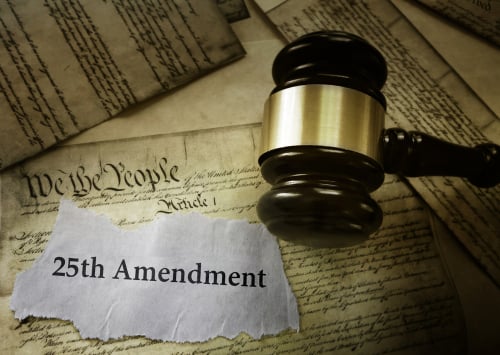What if? Some presidential succession questions aren't answered by 25th Amendment and federal law

Image from Shutterstock.com.
President Donald Trump’s hospitalization Friday has led to speculation about what could happen in some unusual succession and election scenarios.
What if Trump and Vice President Mike Pence were to become incapacitated? What if Trump or former Vice President and Democratic presidential nominee Joe Biden died before the election or after the election but before the inauguration? And what if the law providing for succession is unconstitutional?
Among the publications addressing those scenarios are the New York Times, the Washington Post (here and here), the Atlantic and NPR.
Article II, Section 1, Clause 6 of the Constitution says the vice president assumes the powers and duties of a president in the event of an inability to serve. The 25th Amendment goes further to address how to determine when a president is incapacitated.
Under the 25th Amendment’s Section 3, a president can determine that he is incapacitated by communicating that he is unable to carry out his duties to the speaker of the House and the president pro tempore of the U.S. Senate (currently Republican Sen. Charles Grassley of Iowa). A president then informs the same officials when he is ready to resume his duties. While a president is incapacitated, the vice president serves as acting president.
The 25th Amendment’s Section 4 applies when a president is unable to discharge his duties and is unable or unwilling to give consent. The vice president takes over after he and a majority of Cabinet secretaries or a group appointed by Congress informs the House speaker and president pro tempore that the president is incapacitated.
A president can inform the two officials and resume his duties, unless the vice president and a majority of the officials who declared the president incapacitated object. At that point, Congress decides the issue, with a two-thirds vote of both chambers required to prevent the president from taking control.
What if the president and vice president were to die or be unable to serve? The Presidential Succession Act says the speaker of the House would assume the presidency, followed by the president pro tempore of the Senate, the secretary of state, and then other Cabinet members.
The law doesn’t provide answers to all the questions, however. What if Trump and the vice president were both severely ill?
“The Presidential Succession Act is triggered by the deaths of the president and vice president,” according to Norman Ornstein, an American Enterprise Institute resident scholar, in the Washington Post. “There is no path in law or the Constitution to determine who has presidential authority if both are, say, on ventilators.”
Without clear direction on how to decide whether they are capable of serving, there could be competing claims to presidential authority.
The presidential succession law’s constitutionality could also be an issue. Some constitutional law experts have argued that the law unconstitutionally places legislative officials in line for the presidency.
“If legislators are in line to fill a vacant Oval Office, a pervasive conflict of interest will warp their judicial roles in presidential and vice-presidential impeachment proceedings,” according to a Stanford Law Review article.
More questions would arise if Trump was unable to run for reelection. The Republican National Committee would choose a new nominee, but it is likely too late to change ballots that have already been printed and some of which have been cast.
If Congress was to postpone the election, the results would still have to be certified before the constitutional deadline of Jan. 20 to swear in a president. If the election goes forward and the winner died or couldn’t serve, state electors would still vote.
Many states bind their electors. The U.S. Supreme Court ruled in July in Chiafalo v. Washington that states can enforce a pledge by electors to support the popular vote winner. But the court noted a likely exception to that rule in footnote 8.
“The electors contend that elector discretion is needed to deal with the possibility that a future presidential candidate will die between Election Day and the Electoral College vote,” the footnote said. “We do not dismiss how much turmoil such an event could cause. In recognition of that fact, some states have drafted their pledge laws to give electors voting discretion when their candidate has died. … And we suspect that in such a case, states without a specific provision would also release electors from their pledge. Still, we note that because the situation is not before us, nothing in this opinion should be taken to permit the states to bind electors to a deceased candidate.”



